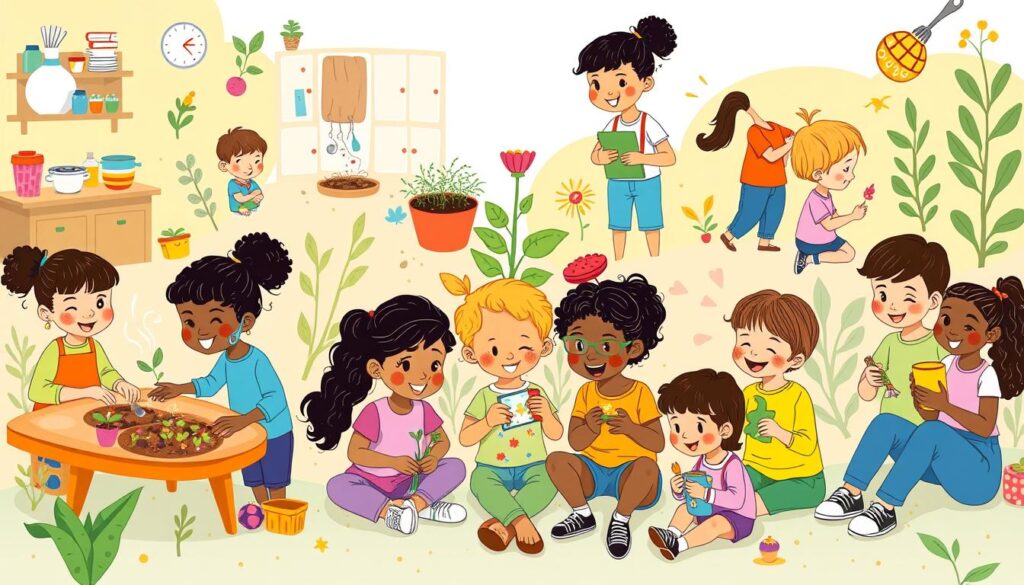Reflecting on our own childhood, many of us may recall moments of uncertainty where life felt like a series of unanswered questions. As parents, guardians, or educators, we hold the incredible responsibility of guiding our children to navigate their first steps in the world with confidence and resilience. Teaching kids the 11 Essential Life Skills Every Child Needs to Learn is more than just preparing them for independence; it’s about empowering them to tackle real-life challenges that will inevitably arise. From learning how to communicate effectively to managing their time wisely, these skills are the building blocks of successful child development.
According to Jennifer Caffelle, fostering these life skills not only enhances socialization but also nurtures reasoning and self-esteem in our children. As we equip them with practical skills, we prepare them for a future where they can thrive and face challenges head-on. Let’s explore how these essential skills can shape a more confident and self-sufficient generation, ready to embark on their life journeys.
Key Takeaways
- Life skills enhance child development and empower kids for future challenges.
- Teaching 11 essential life skills fosters independence and resilience.
- Practical skills contribute to improved socialization and self-esteem.
- Life skills education is vital for preparing children for adulthood.
- Encouraging critical thinking and problem-solving shapes successful individuals.
- Creating a supportive learning environment boosts children’s confidence.
- Effective communication skills are fundamental for healthy relationships.
Understanding the Importance of Life Skills in Child Development
Life skills play a crucial role in the journey of child development. As children acquire various skills, they become more equipped to tackle challenges that come their way. These skills foster independent thinking and self-sufficiency, essential traits that contribute to making informed decisions. Children who are guided in learning practical skills are often more confident in their abilities to navigate life.
Impact on Independence and Self-Sufficiency
Encouraging children to take on age-appropriate chores can greatly enhance their sense of responsibility and independence. Engaging in tasks such as cooking and laundry instills the value of maintaining a clean living space, promoting self-sufficiency. As children learn to manage their responsibilities, they better understand the importance of accountability in their actions.
Boosting Confidence through Practical Skills
Practical skills, like basic first aid and self-defense, instill confidence in children, preparing them for unexpected situations. Moreover, as they learn to communicate their needs and advocate for themselves, they gain a sense of empowerment. The ability to make phone calls or even manage their schedules builds a foundation for their self-reliance, reinforcing their interpersonal skills and emotional intelligence.
Preparing Kids for Real-World Challenges
Real-world challenges require resilience and problem-solving abilities. Teaching children to analyze information critically and make decisions equips them to face various scenarios with confidence. By engaging in extracurricular activities, they nurture creative thinking, encouraging out-of-the-box solutions to problems. Learning to handle disappointments gracefully and understand money management further prepares them for the complexities of adult life.

11 Essential Life Skills Every Child Needs to Learn
Teaching children essential life skills equips them with the necessary tools to navigate their world confidently. These skills not only aid in their development but also assist in building stronger relationships and promoting independence. The following skills are vital for every child’s success.
Communication Skills
Effective communication skills are fundamental for children. Through proper communication, they learn to express themselves clearly and understand others better. This skill enhances their ability to form strong relationships and resolve conflicts peacefully, benefiting both personal and academic environments.
Critical Thinking and Problem-Solving
Critical thinking and problem-solving empower children to analyze situations and make sound decisions. These skills encourage them to approach challenges logically, leading to more effective solutions in various aspects of their lives. Improving these abilities cultivates a mindset geared towards overcoming obstacles.
Decision-Making Skills
Strong decision-making skills are essential for children as they learn to weigh options and consider consequences. This ability fosters independence, enabling them to make informed choices confidently. Developing these skills prepares kids for real-life scenarios and promotes autonomy in their daily activities.
Emotional Intelligence and Resilience
Emotional intelligence plays a crucial role in a child’s ability to handle feelings and navigate social situations. This skill fosters resilience, allowing them to bounce back from setbacks and maintain positive relationships. As children develop emotional intelligence, they become adept at managing stress and understanding others’ emotions.
Time Management
Mastering time management helps children prioritize tasks and balance their commitments effectively. By learning to manage their time wisely, they can reduce stress and improve their academic performance. This skill is essential for achieving personal goals and maintaining a sense of accomplishment throughout their lives.

Practical Ways to Teach Life Skills at Home
Teaching life skills at home can greatly enhance a child’s development, encouraging both independence and confidence. Parents can easily incorporate these skills into daily routines, creating a supportive environment that fosters learning and growth.
Integrating Skills into Everyday Activities
One effective strategy involves integrating life skills into everyday activities. For example, involving preschoolers in simple tasks such as washing fruits or loading the dishwasher can provide practical experience. Early elementary children can assist with making simple meals or cleaning countertops, while older kids can take on responsibilities like doing laundry or caring for houseplants. These tasks not only teach essential skills but also promote teamwork within the family.
Creating a Supportive Learning Environment
A supportive environment plays a crucial role in teaching life skills. When children feel safe and encouraged, they are more likely to engage and learn. By allowing kids to practice new skills without fear of criticism, parents can boost their self-management capabilities. Encouraging a growth mindset enables them to embrace challenges, building resilience that will serve them in the future.
Encouraging Independence through Chores
Assigning age-appropriate chores is critical for fostering independence. Tasks like taking out the trash or folding laundry instill a sense of responsibility and accountability in children. Parents should provide guidance but allow children the freedom to complete tasks on their own. This approach cultivates self-sufficiency and builds confidence, essential elements in a child’s journey towards adulthood. Parenting tips supporting this strategy highlight the importance of giving children opportunities to learn from their successes and mistakes.
Additional Life Skills to Foster in Children
Beyond the fundamental life skills, fostering additional competencies in children enriches their development. Skills such as financial literacy, basic first aid, self-defense, hygiene, and household management prepare them for adulthood in a holistic way. Engaging your child in these areas nurtures a well-rounded individual ready to face the world.
Financial Literacy for Future Success
Instilling financial literacy in children ensures they grasp essential concepts like saving, spending, and budgeting. Such knowledge is vital for their future independence. Early education in money management helps them navigate their finances effectively as they grow older, allowing them to make informed decisions about their resources.
Basic First Aid and Self-Defense
Equipping children with basic first aid and self-defense skills prepares them for emergencies and boosts their confidence. Understanding how to react in critical situations not only enhances their safety but also empowers them to help others in need. This knowledge is invaluable as they encounter various situations, fostering resilience and self-assurance.
Basic Hygiene and Household Management
Teaching children the significance of hygiene is essential for their overall health. Encourage them to maintain routines like brushing their teeth, bathing regularly, and caring for their hair. Incorporating these practices into their daily rhythm lays the groundwork for healthy habits. Equally important, household management skills, including chores suited to their age, help them learn responsibility and organization. Parents often find that engaging children in practical tasks not only teaches life skills but also reinforces family bonds.
Conclusion
In summary, the journey towards children’s success begins with teaching essential life skills that shape their character and capabilities. The parenting importance in fostering a supportive environment cannot be overstated; it serves as the bedrock for children to develop self-sufficiency, confidence, and resilience. By incorporating these skills into daily routines, parents empower their children to tackle real-world challenges head-on.
Instilling skills like communication, critical thinking, and decision-making turns everyday interactions into valuable lessons. These abilities not only prepare kids for the future but cultivate zest and determination in their endeavors. Encouraging habits such as gratitude, focus, and self-control lays a strong foundation, paving the way for a successful and fulfilling life ahead.
Ultimately, these vital life skills serve as the toolkit for navigating life’s complexities. By engaging children in learning these skills, we help them become not just capable individuals but also optimistic leaders ready to embrace their future with confidence and passion. The foundation we build today will undoubtedly lead to a brighter tomorrow for our children.











